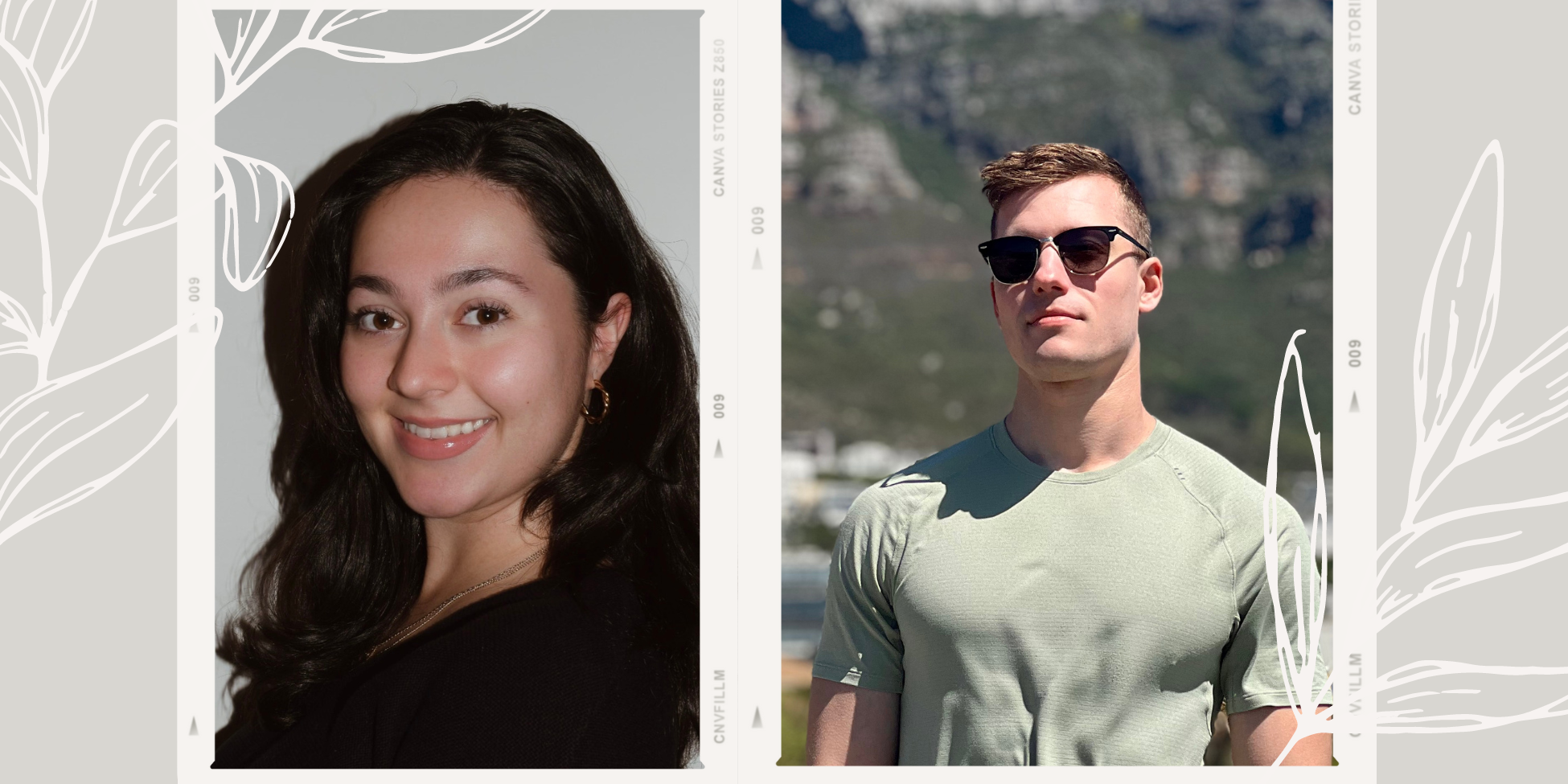
Within the diverse academic community of UBC, we are pleased to present two outstanding students from the Chinese Language Program (CLP). Their linguistic journeys have not only enriched our campus but have also transcended cultural boundaries. Join us in applauding their commitment and enthusiasm for the Chinese language as we showcase their distinctive tales of language proficiency, cultural exploration, and academic excellence here at UBC.
We are thrilled to present one of our accomplished members, David Sasse (史大卫), whose academic journey at UBC is truly inspiring. Starting from his initial days as a UBC student to his current position as a lecturer in UBC’s Earth and Ocean Science Department, David’s linguistic journey transcends the confines of the classroom. His dedication to Chinese language learning has significantly enhanced both his academic and professional endeavors.

1. Can you share with us your background in learning Chinese. What initially motivated you to study Chinese at UBC, and how has that motivation evolved throughout your academic journey?
In 2016, I explored Shanghai, Beijing, Guangzhou, and Inner Mongolia during my visit to China. Though not speaking Chinese at the time, the captivating people, culture, and food left a lasting impression. Throughout my Bachelor’s degree, I met my girlfriend and recognized the importance of learning her mother tongue to better appreciate her cultural background, especially as her parents had limited English proficiency. Over the years, as my Chinese proficiency improved, my goal shifted towards working or conducting research in China. While a 2020 work contract for Shanghai was disrupted by the pandemic, I reflect on my accomplishments at UBC with gratitude, feeling more prepared for future possibilities.
My official Chinese language journey started in grad school. Despite already speaking Swedish, German, and English, I found the concept of tones in Chinese challenging. Thanks to fantastic teachers and OP volunteers, my first-year Chinese experience was motivating. After graduation, I took a two-year break before resuming one-to-one training in Beijing, self-studying for the HSK exam, and passing proficiency levels 1-4. In 2022, returning to UBC as a lecturer allowed me to continue Chinese courses, and I am currently enrolled in CHIN 407. The 400-level courses, especially with heritage students, have significantly enhanced my fluency and cultural understanding through engaging class discussions.
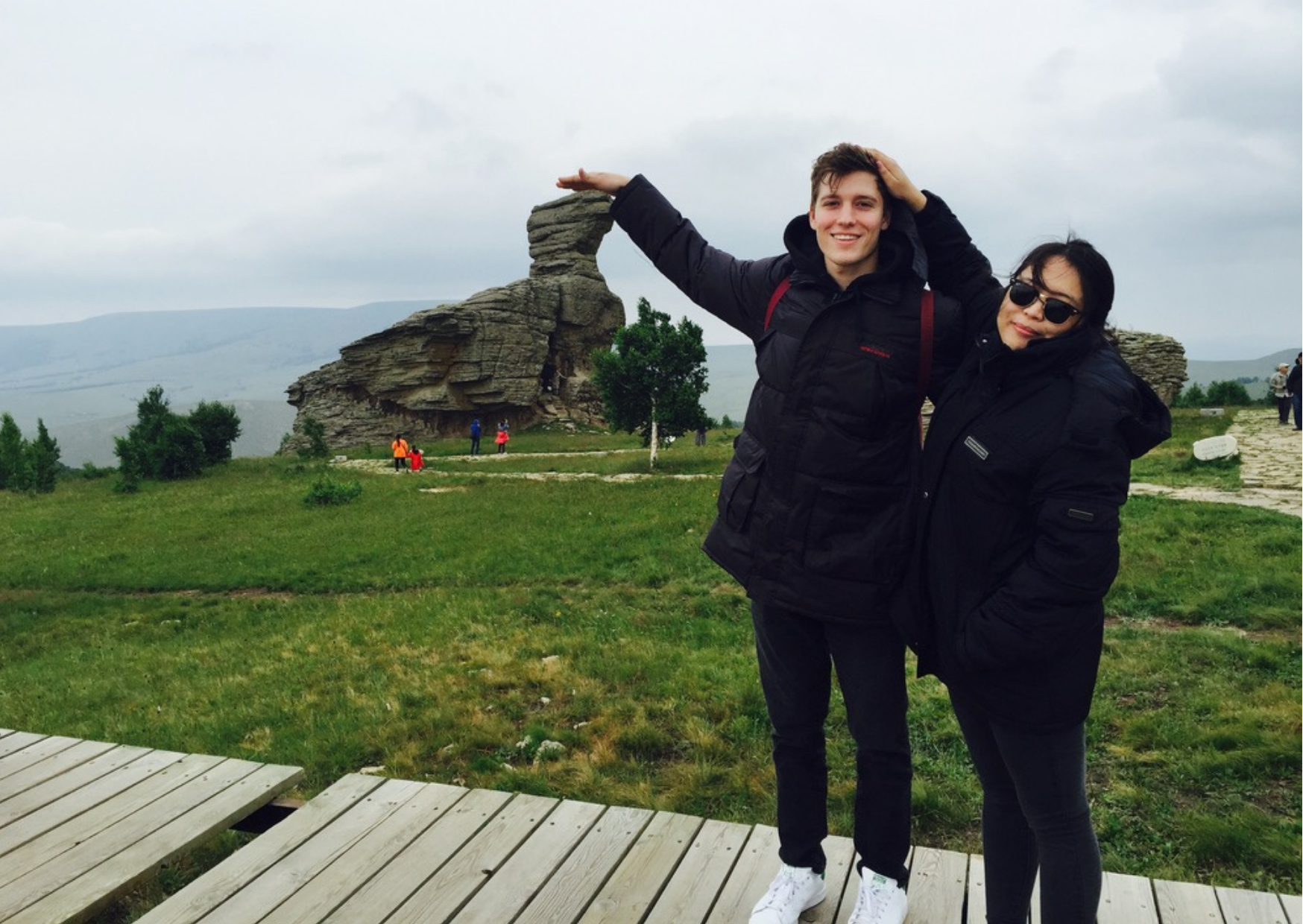
David and his girlfriend visiting a Chinese national park in 2016
2. Can you share a particularly memorable or challenging moment in your Chinese language studies at UBC and how you navigated through it?
Although it’s hard to recall a specific moment, grappling with unfamiliar pronunciation during my time in the 100-level courses was my most significant challenge. Overcoming the fear of making mistakes, I recognized that progress stems from learning through errors. I increased my involvement in class, attended instructors’ office hours, practiced writing via WeChat with friends, and engaged more with Chinese speakers outside of class. I discovered the patience of Chinese individuals in supporting ‘foreigners’ learning the language, finding joy and appreciation in hearing even a few words or complete sentences. While I still encounter basic pronunciation and grammar mistakes, I can now sustain extended basic conversations and grasp the main ideas in Chinese discussions. Embracing mistakes and practicing self-patience have been crucial alongside my language journey.
Check Out David’s Chinese Vlog Video with His Puppy Mocha
3. How have you immersed yourself in Chinese culture during your time at UBC? Are there specific events, activities, or experiences that stand out in enhancing your cultural understanding?
Fortunately, UBC offers abundant opportunities for cultural exploration. I actively participated in Lunar New Year events hosted by the CLP, and during festivals such as the Lantern Festival (元 宵节), the Dragon Boat Festival (端午节), and the Moon Festival (中秋节), special activities in class enriched our understanding, with teachers sharing treats and insights into the festivities. Mandatory oral practice in Chinese language courses played a pivotal role in fostering cultural appreciation through weekly interactions with volunteering native speakers. Additionally, UBC’s diverse community, with many native Chinese speakers, facilitated the formation of numerous friendships—forged in courses, events, and even during regular badminton sessions on campus. My time at UBC has been a vibrant cultural journey, characterized by engaging experiences and meaningful connections within the Chinese community.
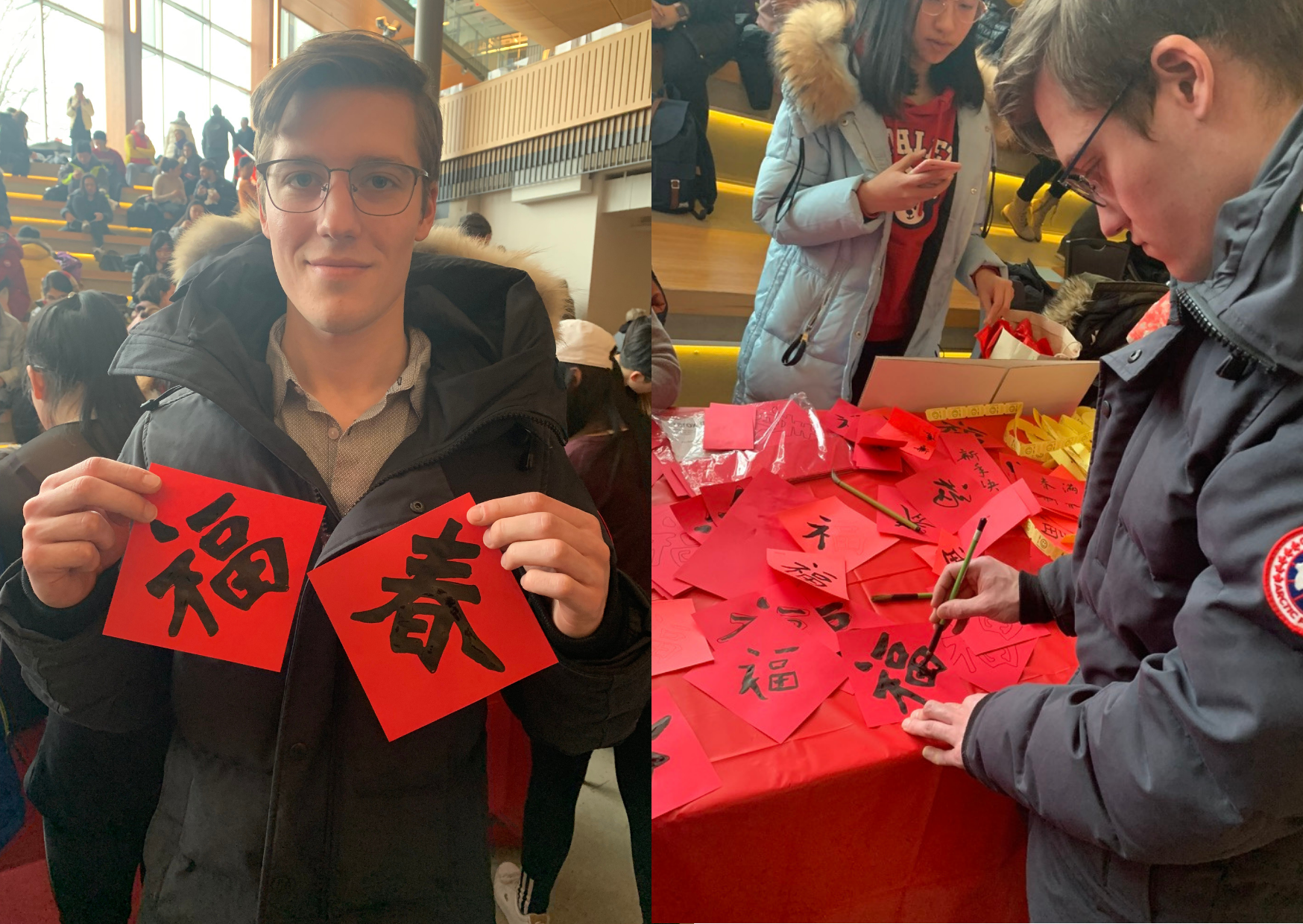
Lunar New Year Celebrations at UBC
4. How has language learning influenced your academic and professional journey? Looking ahead, how do you envision incorporating your Chinese language skills into your future career?
I take pride in consistently advancing my Chinese language skills over the years, and am thankful to have received so much support along the way. The unexpected benefits of learning Chinese have exceeded my expectations. Beyond my role as a lecturer, my work as a self- employed educational consultant has been significantly enhanced. A considerable majority of my clients are Chinese, and communicating with them in Chinese has played a pivotal role in fostering trust and strengthening connections. This language proficiency has proven to be a key that opens doors not only in China but also right here in Vancouver.
Although I’m not sure what the future will entail, I’m open to work and research opportunities in China. To conduct research as a foreigner in China, passing HSK 5 is recommended, and I will be taking the exam later this year (fingers crossed). My ultimate goal in terms of examinations is to pass HSK 6 (The final exam level), and beyond that, I hope to one day be able to communicate effortlessly with Chinese speakers using Mandarin.
Check Out David’s Chinese Final Project on Coffee-making Video
Let’s now delve into Isidora Basanovic’s (白朵拉) language journey at UBC. Isidora’s exploration into learning Chinese started with a fascination for languages. Already fluent in multiple languages, such as English, French, Spanish, and Serbian, she decided to include Chinese in her studies due to its significance in Vancouver. From her initial curiosity, Isidora’s academic journey has evolved into her current quest for more profound cultural immersion.
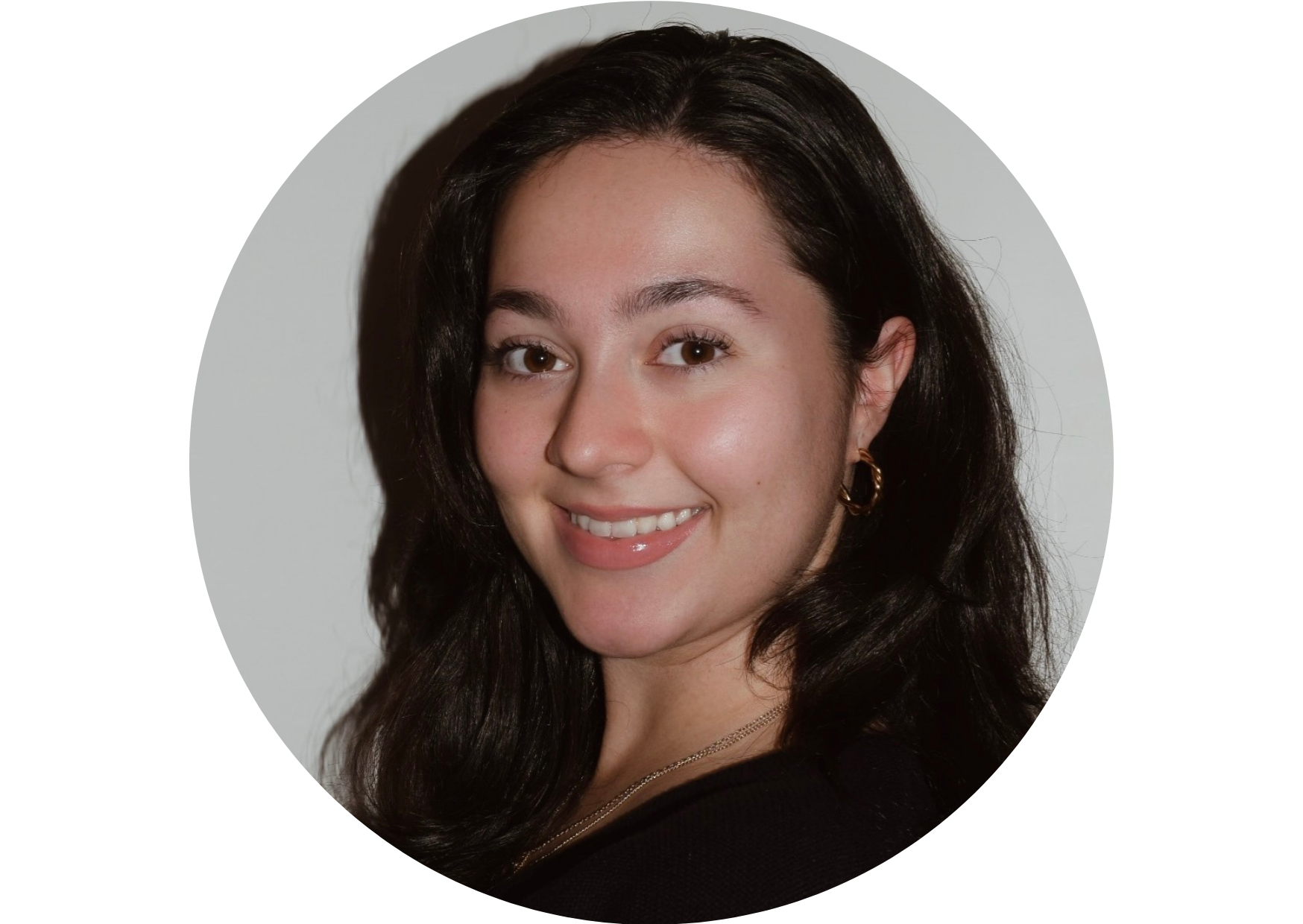
1. What initially motivated you to study Chinese at UBC, and how has that motivation evolved throughout your academic journey?
What initially motivated me to study Chinese at UBC was my passion for languages, so I thought to give it a try by taking the beginner’s course CHIN 131 with Wang Laoshi. What started as a general linguistic interest in Chinese transformed into a deeper desire to understand the language through a deeper perspective of cultural understanding and immersive experiences. Now, majoring in the International Relations program and minoring in Chinese Language and Culture, I am excited to embark on a 6-month exchange in Shanghai in 2024, aiming to fulfill my desire for full cultural immersion.
2. Can you share any significant or challenging moments in your Chinese language studies at UBC and how you navigated through them?
Over the years I’ve developed personalized strategies to navigate the initial and ongoing challenge of mastering tones in my Chinese language journey. Drawing on my musical orientation, I approached tones as notes, humming them before integrating with consonants and vowels. To me, the distinctive grammar structures in Chinese, compared to English, also presented a persistent challenge. To overcome this, I treated it as a new formula while emphasizing structure and relying on repetition. This method aided me in applying it to both written exercises in class and spoken practice sessions, playing a pivotal role in my language learning experience.
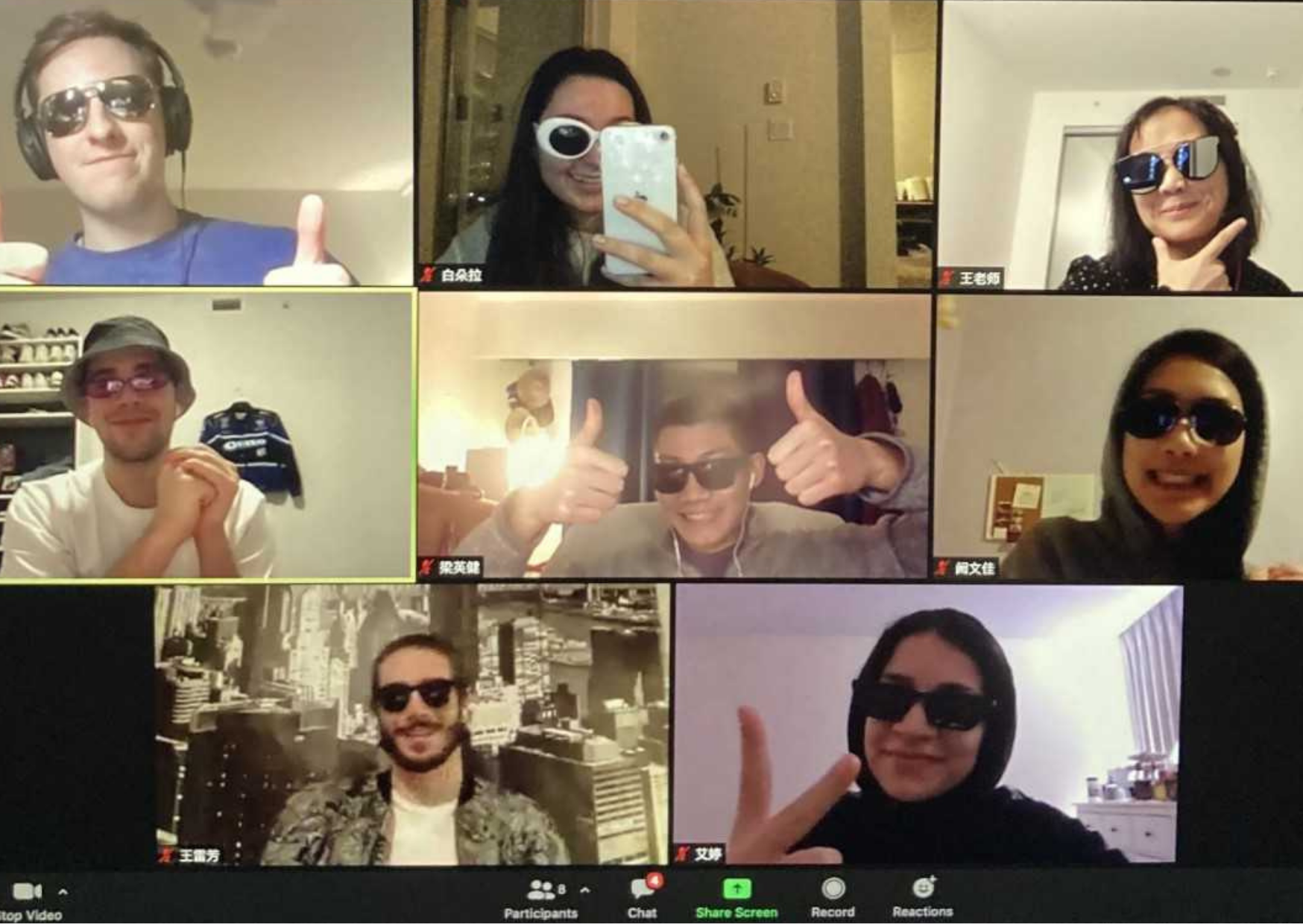
Lunar New Year Singing Competition Event
3. How have you engaged with Chinese culture during your time at UBC? Are there particular events, activities, or experiences that have significantly enriched your cultural awareness?
I’m grateful for the abundant opportunities for cultural immersion provided by the Chinese Language Program at UBC. The Oral Practice program where I converse weekly with native Mandarin speakers has been instrumental in my learning journey. These partners not only help identify my mistakes but also guide me on improvement, emphasizing the importance of repetition.
Beyond the classroom, my involvement in the tandem program each semester allowed me to meet with language partners weekly. During these sessions, we engaged in casual English conversations to enhance their language skills, followed by casual Mandarin discussions. Connecting with different individuals each semester has not only enriched my language learning but also fostered strong friendships.
Furthermore, engaging in enjoyable events hosted by the CLP and the Department of Asian Studies has been a standout experience, enhancing not only my knowledge of Chinese culture, cuisine, games, and activities but also offering valuable insights into diverse Asian cultures, writing systems, and languages.
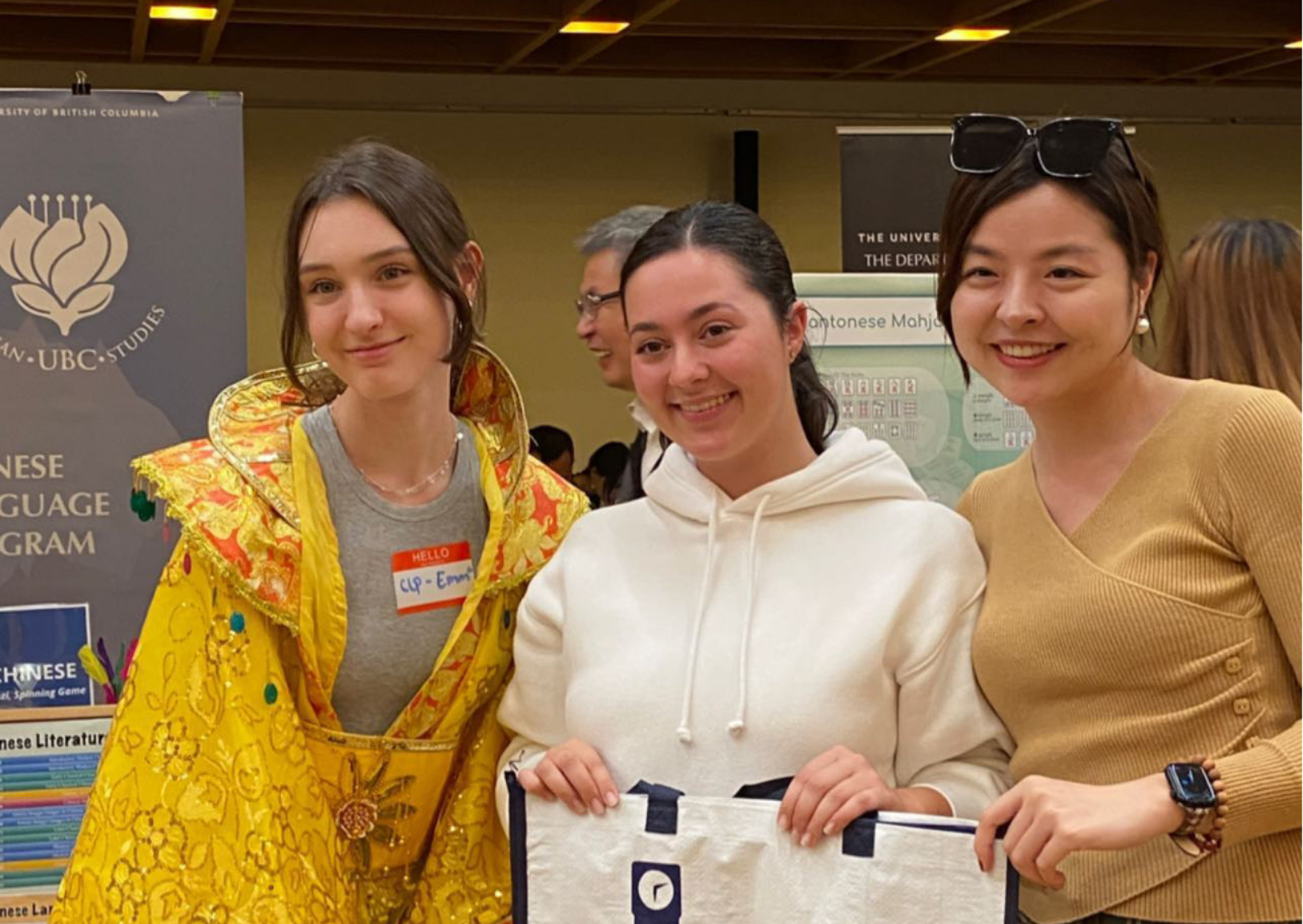
Asian Studies Welcome Back Night with Tao Laoshi (right) and Work Learn Emma (left)
4. How has language learning impacted your future academic and career paths?
Learning Chinese has opened up doors and shaped additional aspects of my academic and career journeys. In my major of International Relations, cultural understanding is crucial, and language, often termed the essence of diplomacy, plays a vital role. Gaining insights into cultural components through language learning enhances my success in the field. In my role as a CRR during a summer internship, I utilized my Mandarin skills to communicate with the public. This marked a significant professional milestone for me, as it was the first time I had the opportunity to openly apply my Mandarin proficiency in a professional environment.
In the summer, my band and I had the privilege of welcoming international students at the UBC International Students Welcome Night held at the Chan Centre. The audience responded with cheers when I acknowledged them in Mandarin, fostering a sincere and heartwarming atmosphere. This musical interaction with the public contributed to a meaningful linguistic connection, offering a gratifying experience of bridging cultural gaps.
Check Out Isidora’s Chinese Final Project on a Mock Interview Video
David and Isidora’s stories illuminate the fulfilling journey of learning Chinese at UBC. Through their narratives, they vividly portray the joy of exploring languages, bridging cultural divides, and fostering connections. As they navigate both academic and professional paths while embracing new languages, their experiences underscore the rewarding nature of Chinese language learning.
Within the Chinese Language Program, we take pride in David and Isidora’s continued success and the substantial impact of their language proficiency on their future endeavors. We hope that their stories serve as inspiration for others, encouraging them to embark on their own linguistic journeys and discover the boundless possibilities that language learning offers.
Written By Angelia Tu